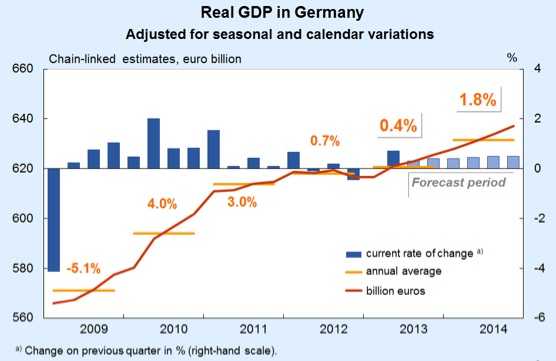Domestic demand is driving the German economy towards an upturn, according to a new report issued by the Center for Economic Studies (CESifo GmbH) in Munich.
A more positive economic climate and lower levels of uncertainty are fueling investment in Germany, the authors added.
Favorable employment figures and income prospects are resulting in greater private consumption.
The report predicts that the German economy (real GDP) will grow by 1.8% next year, after expanding at a moderate 0.4% in 2013. Consumer prices are forecast to rise by 1.6% in 2013 and 1.9% in 2014.
The German public budget is expected to show another surplus.
During the first two quarters of 2013 the world economy picked up thanks to more rapid expansion in the advanced economies, while the emerging ones struggled.
The authors wrote “Growing confidence on the part of companies in most countries suggests that the economic uptick will continue in the second half of the year.”
Source: Federal Statistic Office; forecast by the Joint Economic Forecast, fall 2013.
Even though economic activity in the advanced economies continues to be held back by structural problems, there have been promising signs of a recovery since the beginning of 2013:
- The United States has managed well with cuts to its public budget.
- Japan has succeeded in stimulating its economy with a highly expansive policy.
- The United Kingdom has managed to shake off its persistent state of stagnation and is surging ahead.
- The Euro zone saw increased production for the first time in six quarters.
- Even though economic growth in the emerging economies has recently slowed down significantly, “the growth dynamic remains strong overall.”
- However, the BRIC countries – Brazil, Russia, India and China – still lack good institutions.
Of the greatest importance regarding good institutions is China, which has seen weaker growth. China’s economic growth has been the dynamo for world economic activity over the past decade.
However, Market Business News reported yesterday that China’s economy grew at an accelerated rate during the third quarter of 2013.
Central banks to continue expansive policies
The central banks of the world’s leading advanced economies say they will continue with their expansive policies for the rest of this year and well into 2014. The authors wrote “This announcement was credible since price dynamic and inflation expectations are already low or, in the case of Japan, a higher price dynamic would even be welcome.”
It is virtually impossible to predict when the central banks will decide to tighten policy.
U.S. unemployment figures are expected to improve over the coming year, during which time the U.S. Federal Reserve Bank will most likely start scaling back monetary expansion.
U.S. Congress’ recurrent stalemates
Congress’ inability to ultimately reach a permanent solution to its recurrent stalemates regarding the debt ceiling contributes to periodic instability in the American and world economic environment.
Had the U.S. federal debt ceiling not been raised by mid-October, spending would have been “cut by the size of the current government deficit which is around 4% of gross domestic product.” This would have triggered a severe American recession with serious consequences for the world economy.
Regarding the Euro zone, the report states “In the euro area, the measures and timeframe for reaching overall consolidation goals remain unclear. This forecast assumes that financial policy will become less constrictive.”
Faster economic growth in 2013 and 2014
Slightly better global economic growth figures for the first two quarters of 2013 are expected to continue to the end of the year and well into 2014.
Some of the factors that undermined economic activity since the financial crisis are becoming less significant, resulting in an improvement worldwide in sentiment.
Global production will grow by 2.1% in 2013 (similar to 2012) and will accelerate to 2.8% in 2014, the report forecasts.
German economy on verge of upturn
The report states “The German economy is on the verge of an upturn in autumn 2013. Livelier growth in the world economy and decreasing uncertainty about the crisis in the euro area are creating an environment in which favorable domestic economic conditions have a greater bearing.”
The significant increase in output seen during the second quarter of 2013 did not continue into Q3 because of the catch-up effects after the long, hard winter. However, according to current indicators, there is an underlying upward tendency in the German economy.
As unemployment continues to fall and wages increase, private consumption has been increasing for some time. “This development looks set to continue over the remainder of the forecasting period, since employment will increase considerably.”
A further upturn in the global economy will stimulate the German economy and the country’s exports. While exports to non-European nations have been rising considerably for some time, deliveries within the old continent are expected to improve as its economy stabilizes.
The authors point out, that “the increase in German exports will be moderate. Imports, on the other hand, will be stimulated by strong domestic demand. The contribution of international trade to growth is expected to remain negative on balance.”


